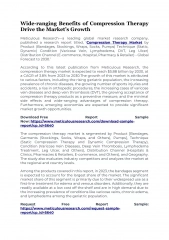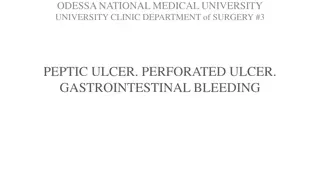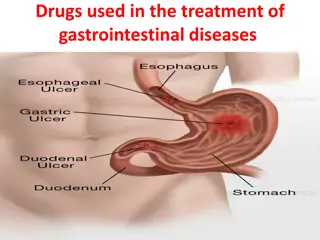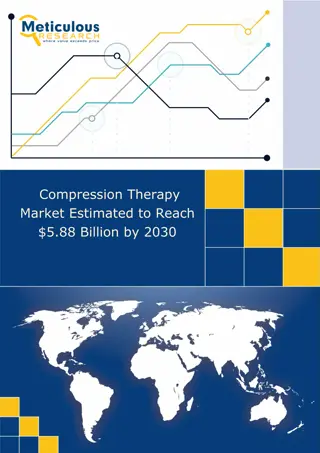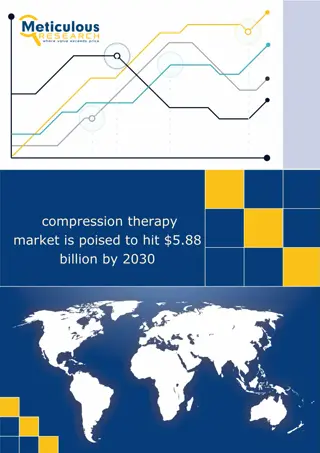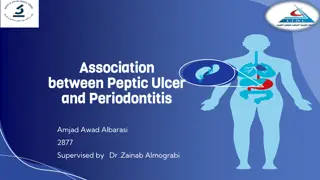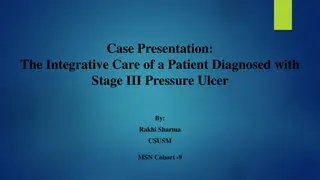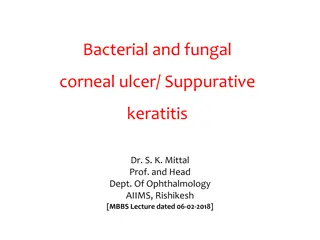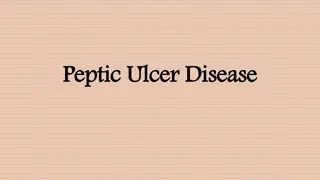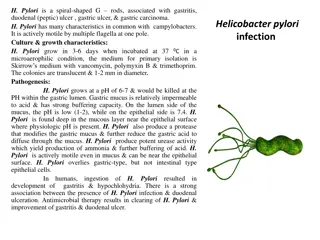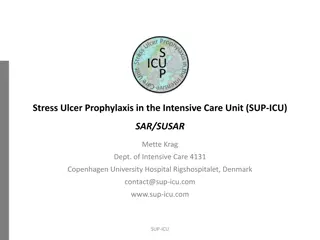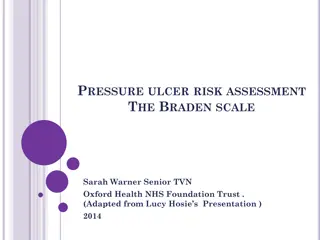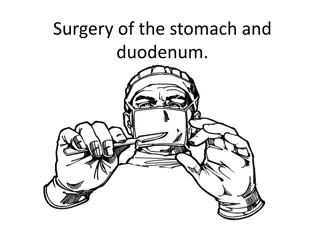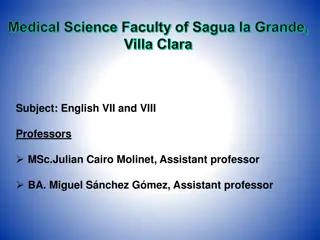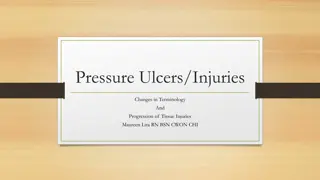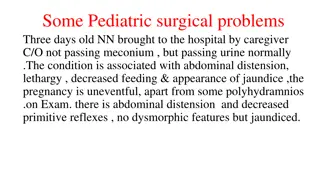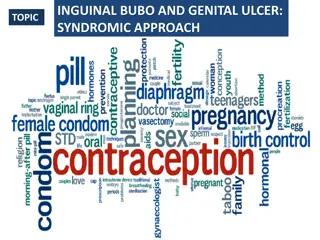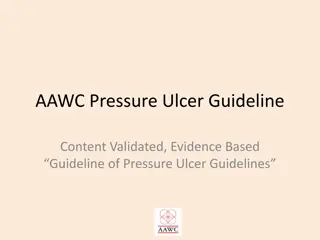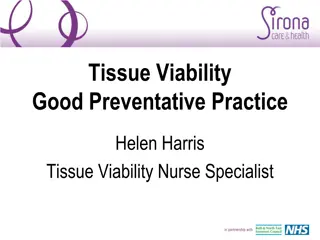Wide-ranging Benefits of Compression Therapy Drive the Market’s Growth
Compression Therapy Market by Product (Bandages, Stockings, Wraps, Socks, Pumps) Technique (Static, Dynamic) Condition (Varicose Vein, Lymphedema, DVT, Leg Ulcer) Distribution Channel (E-commerce, Hospital, Pharmacy & Retailer)
5 views • 2 slides
Comprehensive ICU Protocol for Sedation, Analgesia, and Delirium Control by Dr. Vinod Srivastava
This comprehensive ICU protocol by Dr. Vinod Srivastava, an Associate Professor in Anaesthesiology & Critical Care at KGMU, covers key aspects such as sedation, analgesia, delirium assessment and control, stress ulcer and deep vein thrombosis prophylaxis, and glycaemic control in the ICU setting. Th
1 views • 50 slides
Understanding Peptic Ulcer Disease: Causes, Symptoms, and Treatment
Peptic ulcer disease (PUD) involves ulcerations in the duodenal or gastric mucosa caused by factors like Helicobacter pylori infection and NSAID use. Symptoms include abdominal pain and nausea, and treatment often involves H. pylori eradication and proton pump inhibitors to prevent complications lik
0 views • 77 slides
Peptic Ulcer Disease: Treatment Approaches and Helicobacter pylori Eradication
Common gastrointestinal conditions such as peptic ulcers can be effectively treated through approaches like eradicating H. pylori infection, reducing gastric acid secretion, and using mucosal protecting agents. Helicobacter pylori eradication is crucial for healing ulcers and preventing recurrence,
0 views • 27 slides
Forecasting the Compression Therapy Market Valued at $5.88 Billion by 2030
Meticulous Research\u2014a leading global market research company, published a research report titled \u2018Compression Therapy Market Size, Share, Forecast, & Trends Analysis by Product (Bandages, Stockings, Tapes, Pumps) Technique (Static, Dynamic) Condition (Varicose Vein, Lymphedema, Leg Ulcer)
5 views • 3 slides
Compression Therapy Market Estimated to Reach $5.88 Billion by 2030
Meticulous Research\u2014a leading global market research company, published a research report titled \n\u2018Compression Therapy Market Size, Share, Forecast, & Trends Analysis by Product (Bandages, Stockings, Tapes, Pumps) \nTechnique (Static, Dynamic) Condition (Varicose Vein,\n Lymphedema, Leg U
0 views • 3 slides
compression therapy market is poised to hit $5.88 billion by 2030
Meticulous Research\u2014a leading global market research company, published a research report titled \n\u2018Compression Therapy Market Size, Share, Forecast, & Trends Analysis by Product (Bandages, Stockings, \nTapes, Pumps) Technique (Static, Dynamic) Condition (Varicose Vein, Lymphedema, Leg Ulc
0 views • 3 slides
Association Between Peptic Ulcer and Periodontitis: Insights and Connections
Previous studies have suggested a potential link between peptic ulcer disease (PUD) and periodontitis. PUD affects the gastrointestinal mucosa, with key risk factors being H. pylori infection and NSAID use, while periodontitis is an inflammatory disease affecting the tissues around teeth. Understand
0 views • 17 slides
Detailed Anatomy Review for GIT Blood Supply
This content provides a thorough anatomy revision focusing on the blood supply of the gastrointestinal tract (GIT). It covers stations discussing the blood supply of the stomach, complications during cholecystectomy, perforated duodenal ulcer scenarios, pancreatic tumors, and structures related to m
0 views • 15 slides
Integrative Care for Stage III Pressure Ulcer Patient
This case presentation focuses on the comprehensive care of a 75-year-old Hispanic male with a stage III pressure ulcer on the sacrum. It includes information on demographics, medical history, medications, subjective and objective assessments, as well as the integration of evidence-based complementa
0 views • 20 slides
Overview of Bacterial and Fungal Corneal Ulcer
Bacterial and fungal corneal ulcers, known as suppurative keratitis, are a significant cause of blindness, included in national blindness control programs. They result from infections by exogenous organisms like S. aureus, S. pneumoniae, Aspergillus, and Candida. Predisposing factors include trauma,
0 views • 28 slides
Understanding Peptic Ulcer Disease and Dyspepsia: Causes and Pathogenesis
Peptic ulcer disease and dyspepsia are common gastrointestinal conditions. Dyspepsia presents with upper abdominal pain and may or may not be associated with peptic ulcers. The most prevalent causes of dyspepsia include non-ulcer dyspepsia, GERD, and peptic ulcers. Peptic ulcers account for a signif
0 views • 24 slides
Helicobacter Pylori: Characteristics, Pathogenesis, and Diagnosis
Helicobacter pylori is a spiral-shaped Gram-negative bacterium associated with various gastrointestinal conditions like gastritis, duodenal ulcers, gastric ulcers, and gastric carcinoma. It exhibits unique characteristics in common with Campylobacters and has specific culture and growth requirements
0 views • 5 slides
Stress Ulcer Prophylaxis in ICU - Adverse Reactions Reporting Guidelines
Guidelines for reporting adverse reactions in Stress Ulcer Prophylaxis in the Intensive Care Unit (SUP-ICU), including definitions of Adverse Reactions (AR), Serious Adverse Reactions (SAR), Adverse Events (AE), Serious Adverse Events (SAE), SARs in SUP-ICU, and SUSARs. Specific conditions considere
0 views • 8 slides
Understanding Pressure Ulcer Risk Assessment with the Braden Scale
Pressure ulcer risk assessment is crucial in healthcare settings to identify individuals at risk of developing pressure ulcers. The Braden Scale, developed in 1984, evaluates six key elements contributing to pressure ulcer development. It provides a standardized method for assessing risk levels base
0 views • 20 slides
Overview of Stomach Surgery and Treatment Options
The stomach plays a crucial role in digestion and is divided into four regions - cardia, fundus, body, and pyloric part. Understanding the anatomy of the stomach is essential for surgical interventions, including treatment for benign and malignant gastric diseases like peptic ulcer disease. Surgical
0 views • 30 slides
Understanding Peptic Ulcer: Symptoms, Diagnosis, and Treatment
Peptic ulcers are holes in the gut lining of the stomach, duodenum, or esophagus. This condition can present with symptoms like upper abdominal pain, bloating, and dark stools. Risk factors include smoking, stress, and certain medications. Diagnosis involves various tests, and treatment includes ant
0 views • 15 slides
Understanding Peptic Ulcers: Causes, Prevalence, and Treatment
Peptic ulcers are circumscribed ulcerations in the gastrointestinal mucosa, commonly caused by Helicobacter pylori infection. They have a higher prevalence in developing countries and are associated with factors like socioeconomic status, poor hygiene, and genetic links. While peptic ulcers naturall
0 views • 54 slides
Understanding Pressure Ulcers and Tissue Injuries Progression
Pressure ulcers, also known as pressure injuries, are localized damages to the skin and underlying soft tissue usually over bony prominences. The National Pressure Ulcer Advisory Panel changed the terminology in 2016 to classify all stages as injuries, not just ulcers. Stages range from non-blanchab
0 views • 13 slides
Pediatric Surgical Problems Overview
A three-day-old infant presenting with not passing meconium, abdominal distension, lethargy, decreased feeding, and jaundice is evaluated for possible pediatric surgical issues. Conditions such as duodenal atresia, imperforate anus, and intussusception are discussed along with their diagnostic and m
0 views • 10 slides
Inguinal Bubo and Genital Ulcer: Syndromic Approach by Dr. Rohit Kumar Singh
This informative content discusses the syndromic approach to managing inguinal bubo, genital ulcers, urethral discharge, scrotal swelling, vaginal discharge, lower abdominal pain, and neonatal conjunctivitis. It includes recommended treatment regimens for lower abdominal pain and emphasizes the impo
0 views • 140 slides
AAWC Pressure Ulcer Guideline: Managing Pressure Ulcers Effectively
This content outlines the AAWC Pressure Ulcer Guideline, providing evidence-based recommendations for assessing, preventing, and treating pressure ulcers. The guideline emphasizes the importance of regular skin assessment, personalized care plans, and interdisciplinary wound care management to impro
0 views • 15 slides
Tissue Viability and Pressure Ulcer Prevention Practices in Healthcare
Helen Harris, a Tissue Viability Nurse Specialist, oversees the management and advice for service users with complex wounds, advanced therapies, and pressure ulcer prevention cases. Her role includes developing strategies, policies, and procedures for Tissue Viability services, catering to a populat
0 views • 14 slides
Essential Nursing Concepts Review
This content covers a wide range of essential nursing concepts such as proper management of catheter bags, blood pressure reporting guidelines, application of elastic stockings, potential health issues post-surgery, diabetic foot care, elderly patient care, warm pack application, respiratory conditi
0 views • 30 slides
